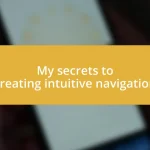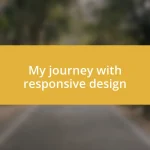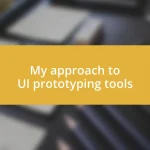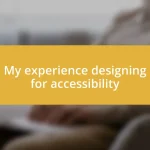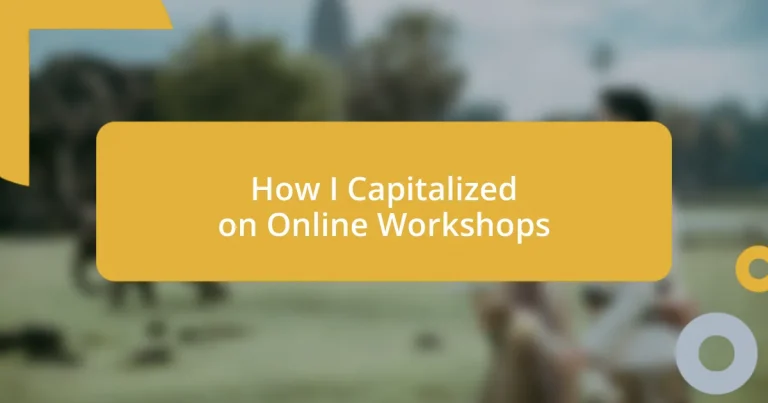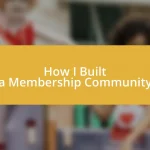Key takeaways:
- Online workshops foster community through shared experiences and diverse perspectives, enhancing the learning process.
- Choosing a specific niche and creating engaging content tailored to participants’ interests are crucial for success.
- Effective marketing strategies, such as utilizing social media and email outreach, can significantly boost workshop attendance.
- Regular feedback and participant interaction help refine future workshops and build a loyal audience community.
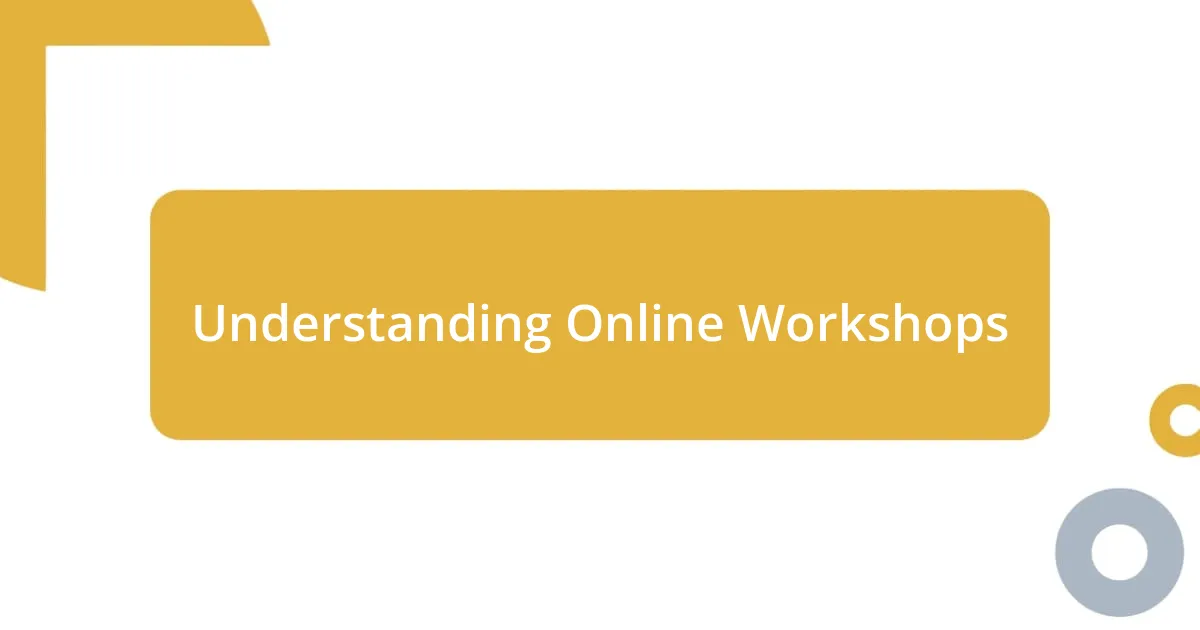
Understanding Online Workshops
Online workshops have become a dynamic platform for sharing knowledge and skills. I remember my first experience with one—it was an empowering moment, connecting with people from diverse backgrounds all eager to learn. Have you ever felt that surge of excitement when a new topic sparks your curiosity? That’s precisely the magic of online workshops.
These sessions offer an intimate learning environment where instructors often encourage interaction. I once attended a workshop where the facilitator invited us to share our personal experiences related to the topic, creating a sense of community. It made me realize how powerful it is to learn from others’ perspectives. Why do you think the exchange of ideas enriches our understanding so much?
Additionally, online workshops provide the flexibility to learn at your own pace. I appreciate that I can revisit recordings or resources whenever needed. This adaptability makes it easier to integrate learning into our busy lives. Wouldn’t you agree that having access to valuable content on your terms can enhance the overall experience?
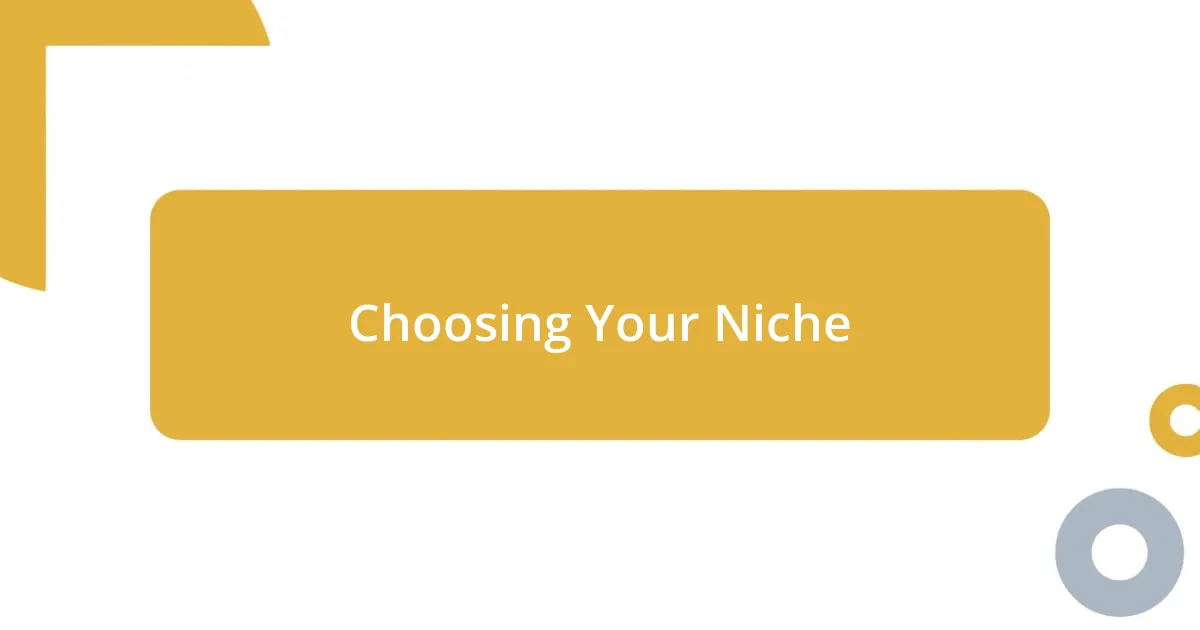
Choosing Your Niche
Choosing your niche is a pivotal step in launching a successful online workshop. When I first entered this space, I found myself overwhelmed with possibilities, but narrowing down to a specific focus truly changed everything for me. It’s essential to identify what you’re passionate about and how it aligns with your expertise because this authenticity resonates with potential participants.
Here are some questions to help you find your niche:
- What subjects excite you the most?
- What skills do you uniquely possess?
- Who is your ideal audience, and what are their pain points?
- What gaps exist in current online workshops that you could fill?
- How can you combine different areas of interest to create something unique?
Reflecting on these points can guide you toward a niche that feels right. For me, it was blending my love for creativity with teaching. This fusion not only invigorated my workshops but also attracted a dedicated audience genuinely interested in what I had to offer.
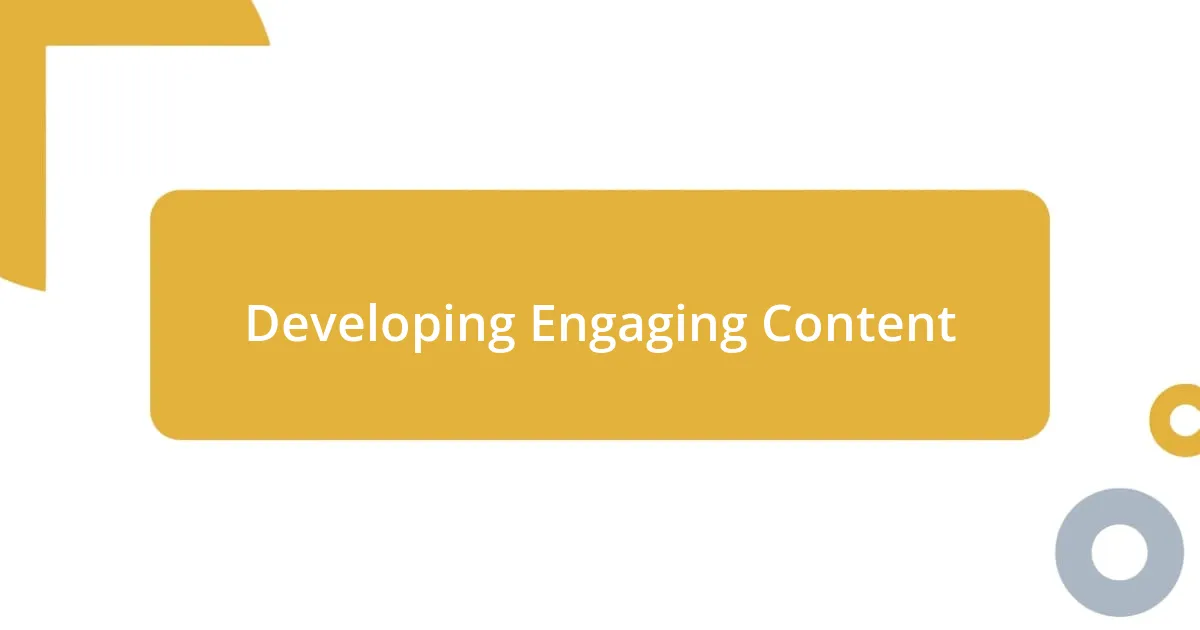
Developing Engaging Content
Developing engaging content for online workshops is essential in grabbing participants’ attention and maintaining their interest. When I create content, I think about what truly resonates with my audience. For example, I once crafted a workshop around personal storytelling, incorporating vivid anecdotes from my life. This not only made the material relatable but fostered a deeper connection with participants, allowing them to share their stories too. Have you ever shared a personal experience in a workshop? It feels liberating and often encourages others to open up.
I believe using a variety of formats can also enhance engagement. Mixing live discussions, pre-recorded videos, and interactive activities keeps the momentum going throughout the session. During one workshop, I introduced a live poll, and the immediate feedback was invigorating. It turned a simple topic into a lively debate, transforming the atmosphere from a lecture to an engaging dialogue. How do you think incorporating interactive elements would change your workshop experience?
Lastly, clarity is key in your presentations. I strive to present complex ideas in straightforward language. A former participant once told me that a particularly clear analogy I used made a challenging subject suddenly understandable. This feedback reminded me that effective communication can turn confusion into clarity, making the content more digestible for everyone involved. What strategies do you use to simplify your content?
| Engagement Strategy | Personal Experience |
|---|---|
| Storytelling | Incorporated personal anecdotes to connect with the audience. |
| Interactive Elements | Used live polls to spark discussion and debate among participants. |
| Clear Communication | Utilized analogies that simplified complex ideas for better understanding. |
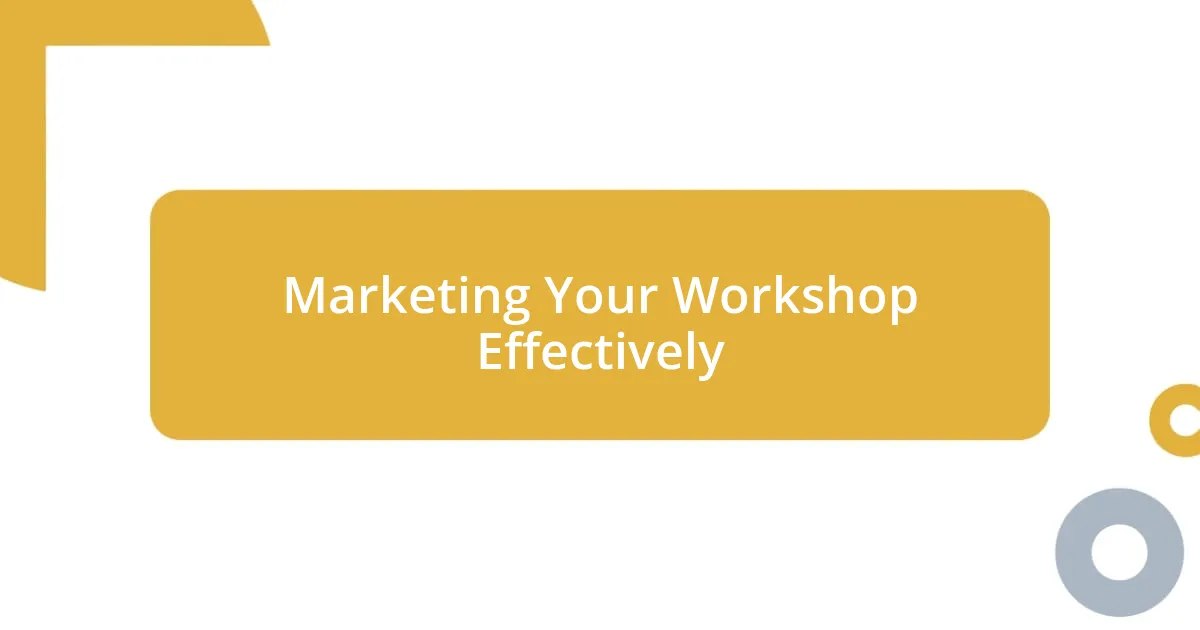
Marketing Your Workshop Effectively
Marketing your workshop effectively is all about positioning and outreach. I personally found that tapping into social media platforms was a game changer for me. By sharing snippets of my workshops through engaging posts and stories, I created a buzz that drew in curious participants. Have you considered how visuals and authentic behind-the-scenes glimpses can make your offerings more relatable?
Moreover, leveraging email marketing can significantly enhance your outreach. I recall crafting a warm, inviting newsletter with insights and personal stories related to my workshop topics. This approach not only kept my audience informed but also fostered a sense of community. Think about this: how often do you engage with your subscribers on a personal level?
Finally, collaborating with other creators or influencers can broaden your reach exponentially. When I partnered with a fellow educator for a joint workshop, we shared our audiences, and the turnout exceeded my expectations. This experience taught me the value of community effort—how have you thought about joining forces to amplify your marketing efforts?
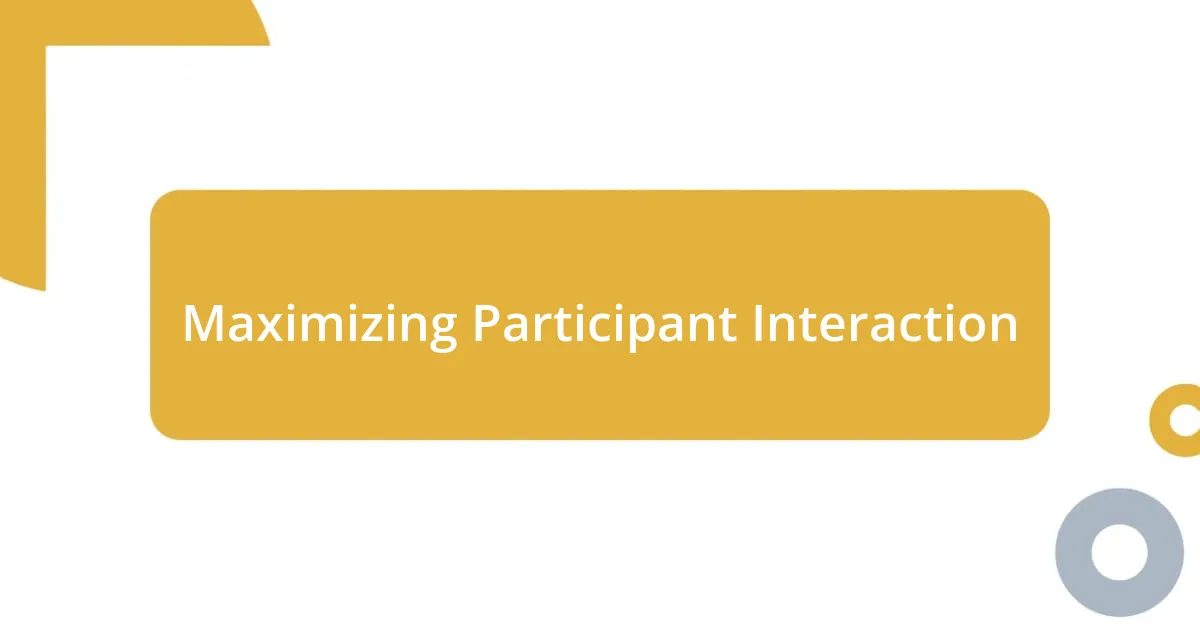
Maximizing Participant Interaction
Maximizing participant interaction is about creating an inviting atmosphere where everyone feels comfortable engaging. I remember one workshop where I opened the floor by asking participants about their expectations and experiences. The moment I did this, the energy shifted. Participants began sharing their thoughts, and the discussion blossomed into a rich exchange of ideas. Can you imagine how much deeper the conversation becomes when everyone feels heard from the start?
Utilizing breakout rooms has been another effective strategy for me. During a session focused on team-building, I divided the group into smaller teams for problem-solving activities. This approach allowed participants to connect on a more personal level, and many expressed that the intimate setting fostered genuine collaboration. Have you ever participated in a smaller group within a larger event? The difference in interaction is often striking.
I also find that regular check-ins throughout the workshop boost engagement. In one of my sessions, I paused every 20 minutes to ask how everyone was feeling about the material. This simple practice made participants feel valued and encouraged them to voice their thoughts or concerns. It’s incredible how a little acknowledgment can propel participation—how do you ensure your audience feels included and engaged during your workshops?
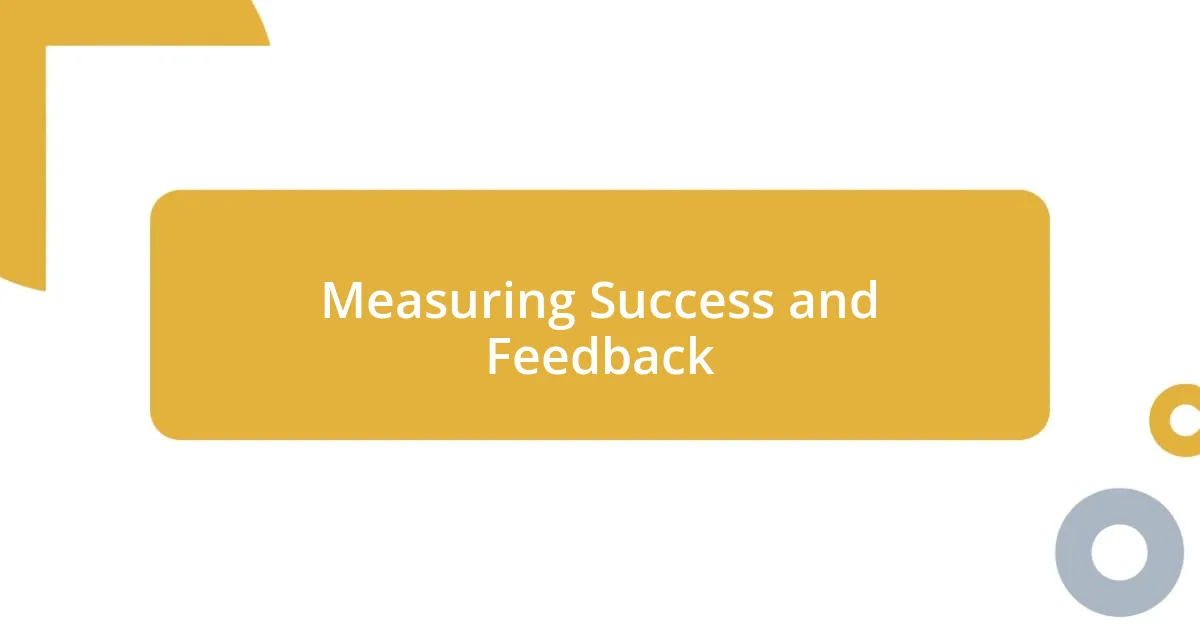
Measuring Success and Feedback
Measuring success for my online workshops hinged significantly on participant feedback. I remember after one particularly intense session, I sent out quick, anonymous surveys asking what resonated with attendees. The insights were invaluable; I learned which activities sparked genuine interest and where I could improve. How often do you seek honest feedback to gauge your impact?
Incorporating qualitative feedback also played a pivotal role in shaping my future workshops. After receiving heartfelt testimonials from participants who felt a sense of transformation, I realized that emotional connections matter. The stories they shared not only validated my efforts but also inspired me to keep refining my approach. Isn’t it inspiring to see how your work can touch others’ lives?
Finally, I track success metrics like attendance rates, engagement levels, and follow-up interaction in my post-workshop communications. For instance, observing a spike in participants returning for subsequent sessions provided solid evidence of my workshops’ appeal. I ask myself, are you analyzing these metrics to understand your audience better and enhance their experience?
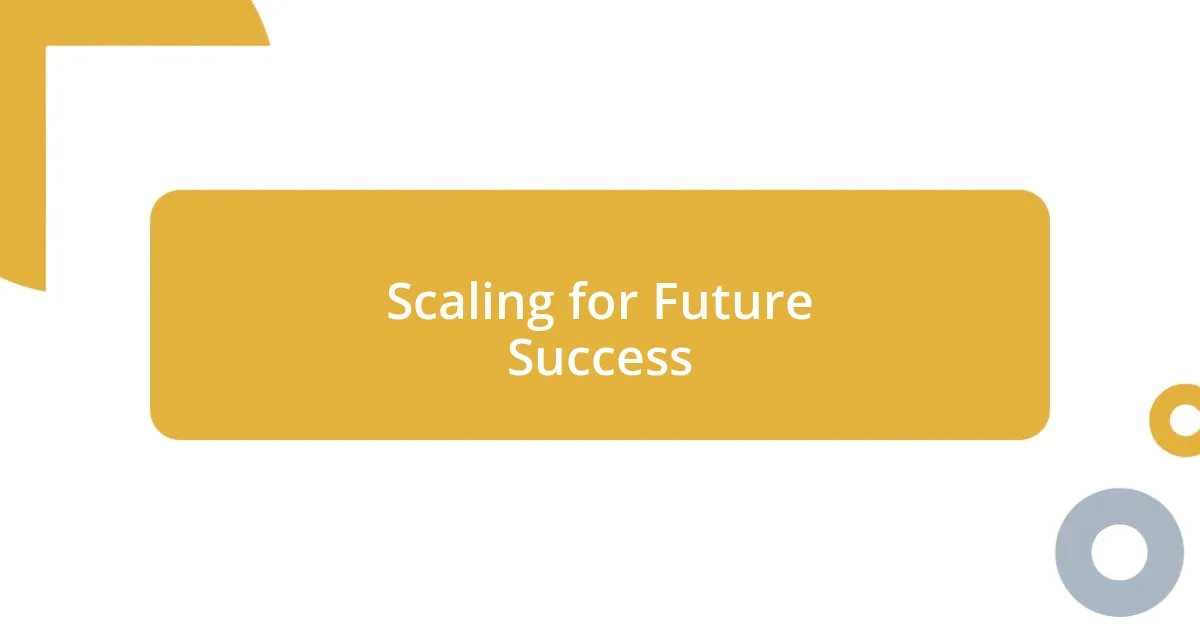
Scaling for Future Success
Expanding my online workshop offerings has been a crucial part of scaling for future success. I vividly recall the day I launched an advanced workshop based on earlier participant feedback. The anticipation in the air was palpable. Seeing familiar names pop up in the registration list filled me with excitement. Have you ever felt that kind of energy when you knew you were building something special?
Diversifying my content has also been instrumental. By introducing various topics and formats, I can reach a broader audience. For example, I once created a mini-series of workshops focusing on niche skills, which allowed participants to dive deeper than in standard sessions. The response was overwhelming, with many attendees expressing that they appreciated the opportunity for specialized knowledge. Isn’t it remarkable how tailored experiences can truly resonate with people?
Lastly, building a community around my workshops has been a game changer. I started a dedicated social media group for participants, fostering ongoing discussions and idea sharing long after the workshops ended. The sense of belonging created in that space often leads to repeat attendees. When I see familiar faces eager to engage, I’m reminded that nurturing relationships is key to sustained growth. How do you cultivate a sense of community in your endeavors?







